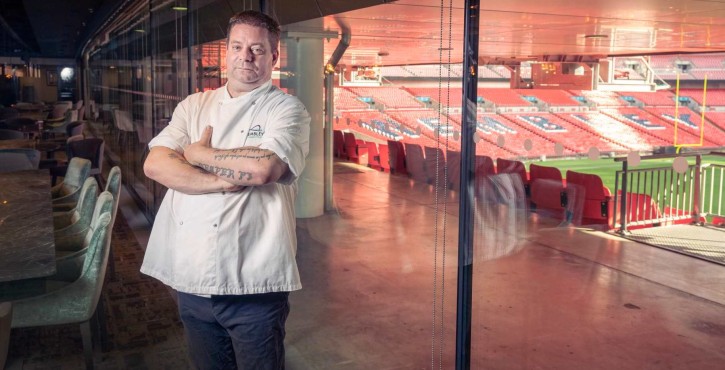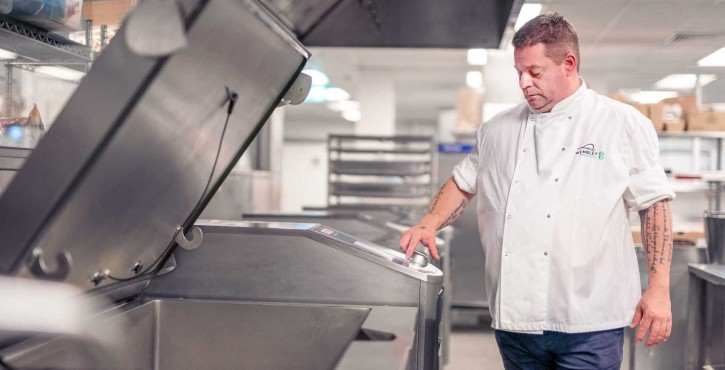
"When it tastes great, we all speak the same language"—that's the motto of our company's 50th anniversary celebration. While the world is full of different people, cultures, traditions, religions, languages, and (of course) dishes, when food tastes great, everyone's on the same page: Mmm! At RATIONAL, we strive for that every single day. That's why we choose to specialize in thermal food preparation. In restaurants, hotels, company canteens, hospitals, schools, supermarkets, and everywhere else food is cooked. Thanks to our partners, specialist dealers and service partners, all of those places enjoy the best possible service around the globe.
Which is how an idea grew into an 'Mmm' that unites the world.
In 1973, Siegfried Meister founded the company now known as RATIONAL AG – a company that places particular emphasis on staff leadership. RATIONAL was his life's work. For 44 years, he led it to success while remaining true to his principle of emphasizing customer benefit. The values Mr. Meister embodied are firmly anchored in company culture to this day.
We sat down with Walter Kurtz, Chairman of the Supervisory Board, to look back at RATIONAL's early years and the innovative work of Siegfried Meister, whose pioneering spirit shapes the company to this day.
“Mr. Meister had a talent for getting other people motivated and excited," recalls Kurtz, who co-founded the company and currently chairs its Supervisory Board.
Meister realized that hospitality industry kitchens would be able to work far more efficiently and effectively if they had a better appliance in which to prepare their soups, potatoes, and cutlets.
He also recalled that what made his mother's duck so delicious was that she basted it in its own juices over and over again. He wanted to create an appliance that would do just that. The result was the 1976 invention of the combi-steamer, which combined convection and the steam essential for moisture and could thus boil, roast, steam, and grill in a single appliance.
"RATIONAL’s original business idea and corporate philosophy remains consistent and successful:
We focus on thermal food preparation. We strive to improve continuously. And most of all, we firmly believe in emphasizing customer benefit, not sales, profit, or growth.
The idea of having customers experience the appliances' benefits directly—up close and personal, with all of their senses—was in RATIONAL’s DNA from the beginning. As a result, our chefs quickly became our calling card.
Service orientation was equally important. “The customer is always right—that was Siegfried's attitude,” Kurtz recalls.
Meister, the visionary and pilot. Kurtz, the doer and organizer. “I think the fact that we were so different was exactly why we complemented one another so well, both professionally and personally,” says Kurtz, who still comes to the office almost every day. Over the years, he and Meister became close friends. They understood one another's strengths and weaknesses, and they knew they could trust each other almost blindly.
“Founding RATIONAL was and still is my life’s work,” Kurtz remarks near the end of our conversation.

Wembley National Stadium - holy ground to the English and home to the Football Association, the “Three Lions," the UCFB (College of Sports and Event Marketing), show stars like Elton John, Adele, Coldplay, and Ed Sheeran, and up to 90,000 fans. They all have one thing in common: At some point they get hungry - just like the police, fire brigade, security personnel, press, and so on. And they all rely on the delicious food service of Stefan Pappert, Lead Chef 3 Lions for Wembley National Stadium, and his team: fish & chips, pizza, nachos are his fastest selling products. Everything is produced in four SelfCookingCenter 202 units and three VarioCookingCenter 311 units in the main kitchen. The kitchen can send out up to 600 chickens in 12 minutes and 150 liters of creamy lobster soup at the same time in a VarioCookingCenter.

Why RATIONAL? Pappert gives us one good reason: He likes to rely on the efficient use of his staff, on digital solutions like ConnectedCooking, on stainless steel, cooking research - and technical refinements like MyDisplay. This means that the most important dishes can be viewed on the unit display as a picture or icon; the corresponding cooking program is stored. Now just one press of a button and the cooking process runs automatically and according to plan: Steam and heat, not too much, not too little. After all, the 600 chickens ultimately have to all look the same.
But a bigger challenge for Pappert and his team is the fact that fans don't come for the food, but for the sports and entertainment. So they see themselves as part of a package: Pappert is all about creating dishes with an element of surprise. Like the hot dogs and nachos that are so long that two people have to carry them.
Worldwide, around 500 expert chefs work for RATIONAL, communicating with our customers every day. With their knowledge and experience, they're the heart and soul of our company. They help ensure that our products are geared toward customer benefit. Their cooking expertise forms the basis for new product development. Our film “4 chefs – 4 journeys” shows how it works. The 2014 film won a Silver Award at the Corporate Film Awards in Cannes.
-fix725x370.jpg)
This is what Euromonitor’s food service experts have to say about how we'll be eating in 50 years’ time. Since 1972, they have been exploring all manner of future-related questions, researching what motivates people in 781 cities and 21 countries. So: what’s next for the food industry?